“No One Should be Left Behind” – Now is the Time to Reform Disaster Related Laws to Support Survivors InsightsEssays: Civil Society in Japan
Posted on October 04, 2023
Japan NPO Center (JNPOC) has a news & commentary site called NPO CROSS that discusses the role of NPOs/NGOs and civil society as well as social issues in Japan and abroad. We post articles contributed by various stakeholders, including NPOs, foundations, corporations, and volunteer writers.
For this JNPOC’s English site, we select some translated articles from NPO CROSS to introduce to our English-speaking readers.
As September 2023 marks the 100th anniversary of the 1923 Great Kantō Earthquake, we share the article on the activities of 311 Change Association, which advocates reforms for the national disaster response system. Yoshifumi Tajiri, Executive Director of JNPOC, is one of the core members of the group.
“No One Should be Left Behind” – Now is the Time to Reform Disaster Related Laws to Support Survivors
“If only I had known I would have to go through this. I wish I had died then.” The comment, printed on the front cover of a pamphlet distributed to the audience, was heartbreaking. I learned it was a quote by a victim of the Great East Japan Earthquake on March 11, 2011.
Japan is hit by major natural disasters like earthquakes and typhoons every year. After a disaster strikes, evacuation centers are set up and various types of assistance are provided to help people rebuild their lives, a cycle that has been repeated time and again.
However, the Disaster Relief Act, the basis for such assistance, was enacted in 1947 and has never been fundamentally changed; most people are evacuated to gymnasiums to be together with others with hardly any privacy. The level of support from the authorities is determined solely by the degree of damages to their housing. Although living conditions and needs for support have changed, what you witness at evacuation centers has not changed much since the enactment of the law, and the supports available to disaster victims remain inadequate. The Disaster Relief Act and other disaster related laws and regulations have failed to respond to the current situation.
In order to change this reality, an emergency “in-House Meeting” was held on June 16, 2023, at the Second Members’ Office Building of the House of Representatives, in Nagata-cho, Chiyoda-ku, Tokyo, to demand a better disaster victim support system that values each and every individual and leaves no one behind. It was organized by a group called Towards a Better Future Disaster Recovery System Based on the Experiences of 3.11 (a.k.a. 311 Change Association). Members of the Diet and other participants listened to the opinions of core members of the organizer and speakers from across Japan.
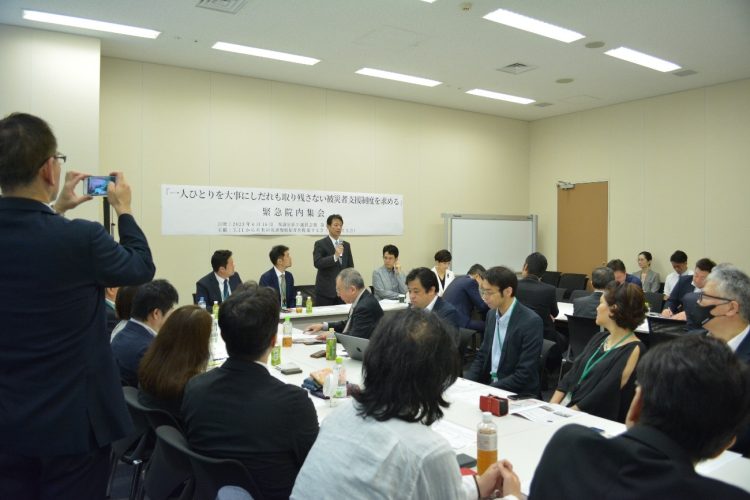
More than 20 Diet members and about 100 people (including online) associated with disaster victim support participated in the event.
Current support system lets some people fall through the cracks
In Japan, we generally depend on activities of private companies and organizations during normal times. For example, we purchase food and daily necessities at supermarkets. When receiving medical or welfare services, people tend to go to private clinics or welfare facilities first.
However, under the current Disaster Relief Act, local governments are required to perform all tasks that are performed by the private sector at ordinary times. The Disaster Relief Act does not specifically mention welfare support, preventing many people from receiving appropriate assistance. Professionals who are in charge of logistics and services during normal times are separated from disaster relief efforts, making it difficult for local governments to ask for their cooperation even when they need it.
“Moreover, because disasters do not occur all the time, it is difficult for any one local government to accumulate expertise in disaster relief. Once facing such a disaster, each local government has responded to each situation on a case-by-case basis in the midst of the chaotic situation. More than 70 years have passed since the enactment of the Disaster Relief Act without it being properly updated and its mechanisms remaining unchanged,” said Taku Sugano, associate professor at Osaka Metropolitan University’s Graduate School, a member of the 311 Change Association.
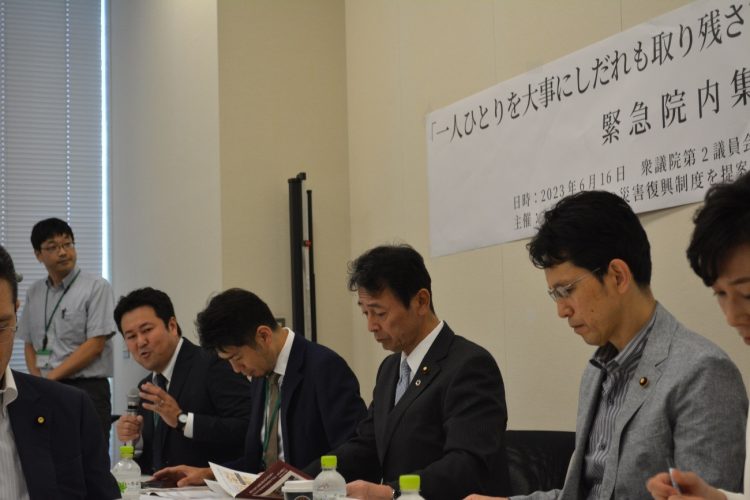
“I don’t think the Disaster Relief Act was inadequate when it was enacted, but rather that it is no longer in tune with the current times. Everyone becomes in need in the disaster-stricken areas, and there are people who are falling through the cracks of the current system of assistance. Experts are also saying that changes are needed. We need the power of members of the Diet to create a system that would not let the survivors say that they wished they had died,” said Tomoyuki Abe, Executive Director of Food Bank Iwate, a nonprofit organization, and the head of 311 Change Association. He handed their proposal to the members of the Diet present, calling for revisions to the Disaster Relief Act, the Social Welfare Act, and other laws related to support for disaster victims, as well as for continued discussions at the Cabinet Office and other ministries and agencies to this end.
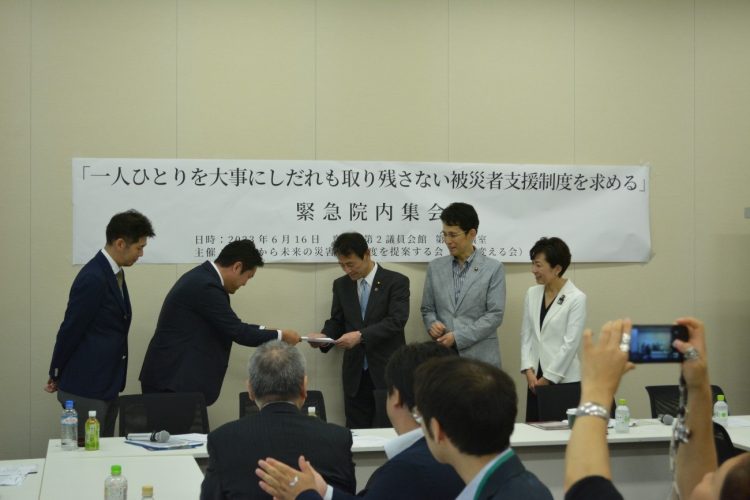
Awareness of dignity links disaster responses and social security
In the talk session following the presentation of the proposal, speakers from across Japan shared their opinions and the current situation in their respective regions. “I was involved in disaster relief after the torrential rains in western Japan in 2018, and since then I have been trying, through private-sector initiative, to change the situation at evacuation centers where, at the time, the only food available was sweet bread. I hope that the public sector will make good use of private sector’s capabilities,” said Tatsuya Ishihara, president of Okayama NPO Center, a nonprofit organization, and added that the private sector is good at promoting DX (digital transformation) and appealed for further cooperation between local governments and the private sector.
Kai Nagano, the vice chairperson of Japan Federation of Bar Association’s Disasters Support Committee, practices law in Shizuoka Prefecture and shared his experience there during Typhoon Talas in 2022. “We received more than 1,300 requests for consultation. Many people told us that they had no homes, and that temporary housing was not readily available. There were cases of people who had been staying in their cars for a long time. One person had been moving from one hotel to another, but had only 5,000 yen left and no place to stay the following day.” In Shizuoka Prefecture, Nagano san and his colleagues were able to respond to such cases in cooperation with local governments, but he commented, “I don’t think that all local governments are able to work well with the private sector.” He continued that the laws should be amended to ensure that people can receive appropriate support wherever they live, so that the support they receive would not differ depending on their place of residence.
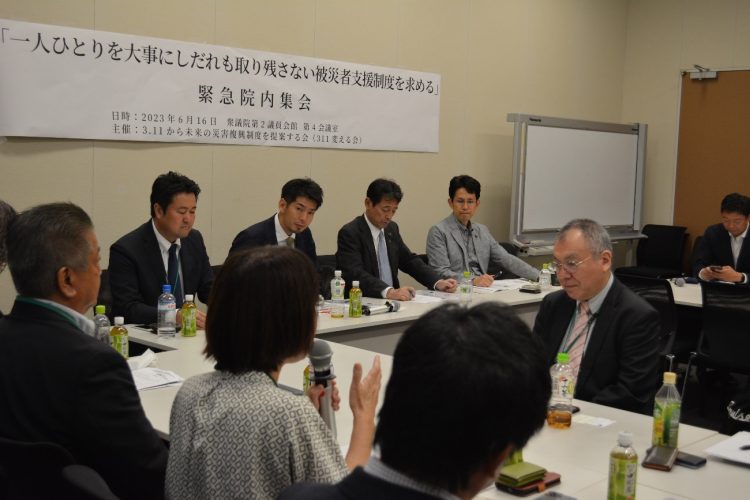
The last speaker was Hajime Kagiya, a professor at Atomi University and the president of Welfare and Disaster Prevention Community Association. “The purpose of the current Basic Act on Disaster Management is to protect the national land and the lives, bodies, and properties of citizens. The notion of protecting lives and bodies originally comes from the social security policy field, however, the fundamental premises of social security have been lacking in disaster management policy; the word dignity is found in the social security laws, but not in those for the disaster countermeasures,” Kagiya san pointed out. “If we managed to add ‘dignity’ to one of the objectives of the Basic Act on Disaster Management, we could expect all regional disaster prevention plans in Japan would include dignity as one of their aims. I believe that the word will connect disaster management and social security.” As the other speakers and participants nodded their heads in agreement, it seemed to me as if a puzzle’s piece, which would solve the issues the speakers had shared with the audience by making their proposals a reality, had been revealed.
The laws must be something that help people look forward
During the Q&A session that followed, there were many comments and questions from the members of the Diet from various constituencies nationwide. “Wouldn’t it be helpful to provide seamless support if those employed at local authorities were encouraged to have second jobs and to connect with NPOs, other private organizations, and companies on a regular basis?” “Can we create a system to make better use of vacant houses and hotels as temporary housing?” “When we had a landslide in our community…” “In an area affected by the Great East Japan Earthquake…” In these questions, I sensed their drive to make things better reflecting on events that had happened in their constituencies.
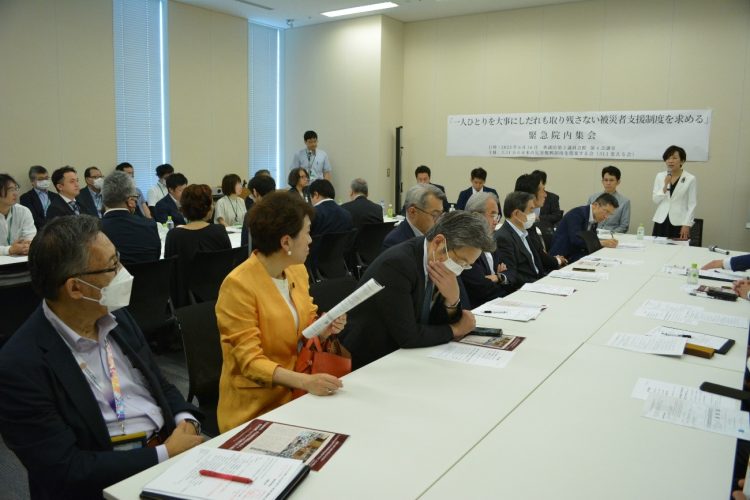
“Almost every year, Japan is hit by a major disaster. Those affected by these disasters need a system that allows them to appreciate the lives saved and move forward with hope. I urge you to push for the amendment of the laws, regardless of party affiliation.” Abe san from the 311 Change Association appealed to the attendees as his final address.
The activities of the 311 Change Association started in the areas affected by the Great East Japan Earthquake and gradually spread to a nationwide movement with a growing number of supporters. The group’s goal is to create a law that protects not only life, body, and property, but also “dignity,” the ability to be who one is in the event of an emergency. I believe that this desire has certainly spread in this place as well.
Original text by Fumiko Tokimori (JNPOC’s volunteer writer) originally posted on August 25, 2023; translated by JNPOC.
Recent Articles
- Shared solutions, stronger communities: Social economy and social innovation in Europe and Japan
- NPO support for disaster victims: Key discussion points
- Beyond support: Fostering genuine dialogues
- Reconsidering the significance of public comments
- Towards a society where children want to embrace life
- The Evolution of Philanthropy: Five approaches shaping contemporary practice